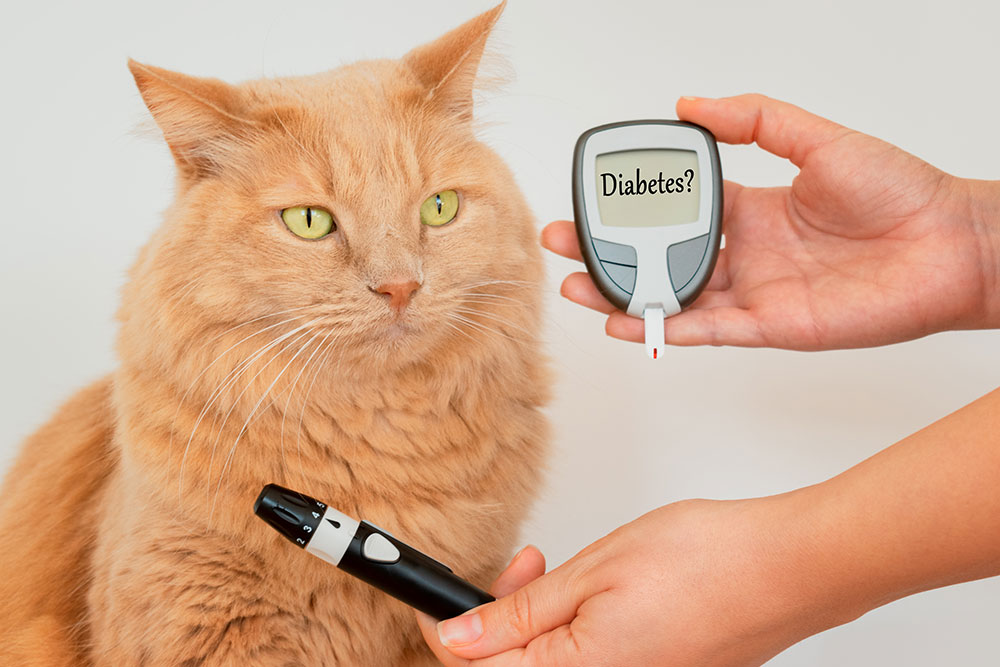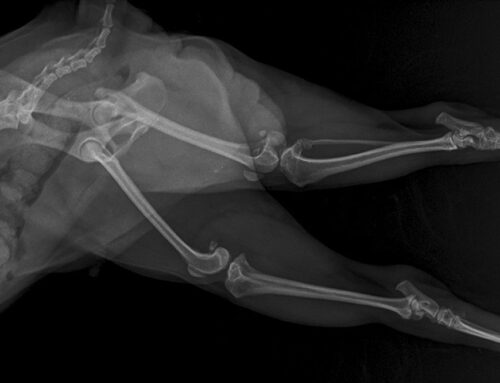A diabetes diagnosis in your pet can feel overwhelming. Not only is your pet facing immediate health challenges, but you’re also looking at a future filled with daily insulin injections, blood glucose monitoring, strict diet management, and more frequent veterinary visits. There’s a lot to learn and a lot to adjust to—but you don’t have to navigate it alone. At Valley Center Veterinary Clinic, we’re here to guide you through every step, helping you manage your pet’s diabetes with confidence and care so they can live a happy, healthy life.
If you’re concerned about diabetes or need support managing your pet’s condition, schedule an appointment with our compassionate team today.
Understanding Diabetes in Pets
What Is Diabetes Mellitus?
Diabetes mellitus is a metabolic disorder where the body either does not produce enough insulin or cannot use insulin properly. This condition is common in middle-aged and senior pets, particularly those who are overweight. Insulin is crucial for regulating blood sugar, and its deficiency or ineffectiveness leads to elevated glucose levels, which can harm various body systems.
Types of Diabetes in Pets
- Type I (Insulin-Dependent Diabetes): This occurs when the body does not produce insulin. It is most common in dogs.
- Type II (Insulin-Resistant Diabetes): Here, the body produces insulin but does not use it effectively, which is more common in cats.
Causes and Risk Factors of Pet Diabetes
Several factors can contribute to the development of diabetes in pets:
- Obesity: A major risk factor for diabetes in pets.
- Age: More common in older dogs and cats.
- Genetics: Certain breeds have a predisposition to diabetes.
- Diet and lifestyle: High-carbohydrate diets may lead to insulin resistance.
- Steroid use: Long-term corticosteroid treatment can increase the risk.
Learn more about diabetes in pets in the AAHA Diabetes Guide.
Symptoms of Diabetes in Pets
Early Signs of Diabetes
Recognizing early symptoms can lead to timely diagnosis and treatment. Look for:
- Increased thirst and urination
- Unexplained weight loss despite normal or increased appetite
- Lethargy and reduced activity levels
- Greasy or unkempt coat, particularly in cats
Advanced Symptoms of Pet Diabetes
As diabetes progresses, more severe symptoms can develop:
- Weakness in the hind legs, known as diabetic neuropathy in cats
- Vomiting and dehydration
- An increased risk of urinary tract infections
- Cataracts, which are common in diabetic dogs
For more insights on senior pet care and diabetes, read the ASPCA Senior Pet Guide.
Diagnosing Diabetes in Pets
Veterinary Testing for Diabetes
Diagnosis is key to effective management. Common tests include:
- Bloodwork: Measures blood glucose levels.
- Urinalysis: Detects glucose and ketones in urine.
- Fructosamine test: Evaluates long-term glucose control.
When to Seek Veterinary Care
If your pet exhibits any symptoms of diabetes, consult your veterinarian immediately. Early intervention can prevent complications and improve your pet’s quality of life.
Learn more about understanding blood glucose levels in pets at the Morris Animal Foundation.
Managing Diabetes in Pets
Insulin Therapy for Pets
Most diabetic pets require daily insulin injections to manage their condition effectively. Common insulins include Vetsulin, Glargine (Lantus), PZI, and Detemir. Adhering to strict dosing schedules is essential to prevent dangerous blood sugar fluctuations.
Diet and Nutrition for Diabetic Pets
Proper nutrition plays a crucial role in diabetes management:
- Low-carbohydrate, high-protein diets are recommended for diabetic cats.
- High-fiber, complex carbohydrate diets can help regulate glucose levels in dogs.
- Consistent feeding schedules help maintain stable blood sugar levels.
Exercise and Weight Control for Diabetic Pets
Regular, moderate exercise assists in regulating blood sugar and maintaining a healthy weight. Avoid sudden weight loss, as it can exacerbate diabetes symptoms.
Learn more here: Nutrition for cats with diabetes.
Diabetic Emergencies: When to Seek Immediate Veterinary Care
Hypoglycemia (Low Blood Sugar) in Pets
Hypoglycemia can occur if insulin dosage is too high or if a meal is skipped, leading to dangerously low blood sugar levels.
Symptoms of Hypoglycemia in Pets
- Weakness and confusion
- Tremors, shaking, or seizures
- Loss of coordination or collapse
What to Do in a Hypoglycemic Emergency
- Rub honey or corn syrup on the pet’s gums.
- Offer a small meal if the pet is alert.
- Seek emergency veterinary care immediately.
For more on hypoglycemia first aid, visit the Red Cross Pet First Aid Guide.
Diabetic Ketoacidosis (DKA) – A Life-Threatening Emergency
DKA occurs when diabetes is poorly managed or untreated, leading to severe complications.
Symptoms of DKA in Pets
- Vomiting and diarrhea
- Extreme lethargy
- Fruity-smelling breath due to ketones
- Labored breathing
Learn more about DKA in pets at Today’s Veterinary Nurse.
Not sure if it’s an emergency? Consult the AAHA Pet Emergency Guide.
Long-Term Monitoring and Preventive Care for Diabetic Pets
Blood Glucose Monitoring at Home
Using pet glucose meters can help track blood sugar trends effectively and prevent dangerous fluctuations. Regular monitoring is vital for ongoing management.
Glucose monitoring in the clinic can be less accurate due to stress and routine changes; tracking at home is generally more accurate. Learning to track blood sugar will save you thousands in veterinary costs over time, from lab costs to improved health through better glucose control.
Explore more on blood glucose curves at AAHA Blood Glucose Curve Guidelines.
Routine Veterinary Checkups for Diabetic Pets
Frequent veterinary visits allow for adjustments in insulin doses as needed and help monitor for secondary conditions such as infections, kidney disease, and cataracts.
Can Diabetes Go into Remission in Pets?
Some diabetic cats may go into remission with proper diet and insulin therapy. Weight management and early treatment can improve the chances of remission.
Read more about diabetes in cats at Cornell Feline Health Center.
Early detection and treatment are key to managing diabetes in pets effectively. With insulin therapy, dietary changes, and routine checkups, diabetic pets can lead healthy lives. If you notice any signs of diabetes in your pet, schedule a veterinary appointment without delay.
Book an appointment for diabetes management today: Schedule a visit at Valley Center Veterinary Clinic.








Leave A Comment